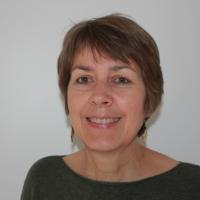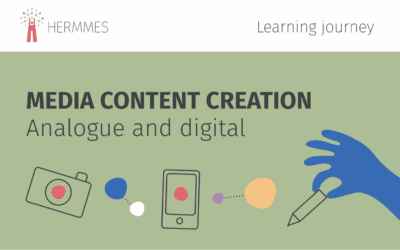Course Overview
This large competence area is subdivided on the basis of different media:
- audio which includes listening and speaking,
- visual which includes images, sculptures, and film) and
- writing which includes diverse products of written language.
Even though in real life and educational settings, the divisions are not always as clear as that.
Activities encompass many things from learning to read and write to advanced journalistic work, from tin can phone to digital audio (post-) production, from flip books and analogue solar photography to recording documentary videos and creating mixed-media digital portfolios.
The more a child goes out into the world, at first crawling, then running, the more they actively engage with their environment, thus actively shape it. We are often surprised at the ingenuity with which a small child in many situations is able to create almost anything with the most simple things. A single piece of paper and the
hat of an acorn can become a boat with a passenger. In producing and creating, the child also develops other important skills, such as dealing with frustration and tolerance because their creations may not work out right away. Ideally, the “product” of creation is something for which the young creator can literally “grasp” all steps in the process of production. This creates the ideal basis for understanding the workings of later productions with digital media, such as recording audio, making stop-motion-movies, writing code, etc.
Course Content
- Journaling
- Defining learning outcomes
- Language acquisition and speech production
- Developing speech and audio skills in school
- Presentational and argumentative skills
- Deepening thoughts on audio production
- Voices from Early Years: Inviting story creation
- Voices from Early Years: Listening and speaking
- Voices from grade school
- Voices from secondary school: radio play, podcast, debating
- Journaling
- Observational task for informal settings
- Observational tasks for formal educational setting
- Journaling
- Defining learning outcomes
- Deepening thoughts on visual media
- Voices from Early Years: drawing, painting, modelling
- Voices from grade school: unplugged storytelling
- Voices from secondary school: illustrating stories
- Voices from secondary school: posters, mind maps, graphics
- Voices from secondary school: photography, stop motion, and film
- Journaling
- Observational task for informal settings
- Observational tasks for educational settings
Instructors
Ulrike Sievers was born in the North of Germany. She studied English and Biology and has taught both of these subjects in Waldorf schools with great enthusiasm for over 20 years. Her main interest is in how school education can create a space in which children and young people can grow up in a healthy way, develop a love for nature and the living world and become interested in other people, their cultures and their languages. She has also contributed nationally and internationally to teacher education and offers courses for students at the Waldorf seminar in Hamburg and Stuttgart.


